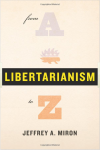The Best Introduction to Libertarianism Ever
Non-Fiction Reviews, Statism, The Basics I am not exaggerating: this is what Jacob Huebert’s just-published book Libertarianism Today is [Scribd version; PDF; Amazon; Mises store; online at https://b-ok dot cc/book/1270024/2f0d43]. I’ve been a libertarian for over 25 years, and have read a lot of libertarian books. I am sure I was one of Laissez Faire Books‘s biggest customers in its heyday in the 80s and 90s. Among introductions to libertarianism I’ve read are Murray Rothbard’s For A New Liberty (1st ed. 1973), David Bergland’s Libertarianism in One Lesson (1st ed. 1984), David Boaz’s Libertarianism: A Primer (1997), Charles Murray’s What It Means To Be A Libertarian (1997), Jeffrey Miron’s recent Libertarianism from A to Z (2010), and probably others I’ve forgotten.
I am not exaggerating: this is what Jacob Huebert’s just-published book Libertarianism Today is [Scribd version; PDF; Amazon; Mises store; online at https://b-ok dot cc/book/1270024/2f0d43]. I’ve been a libertarian for over 25 years, and have read a lot of libertarian books. I am sure I was one of Laissez Faire Books‘s biggest customers in its heyday in the 80s and 90s. Among introductions to libertarianism I’ve read are Murray Rothbard’s For A New Liberty (1st ed. 1973), David Bergland’s Libertarianism in One Lesson (1st ed. 1984), David Boaz’s Libertarianism: A Primer (1997), Charles Murray’s What It Means To Be A Libertarian (1997), Jeffrey Miron’s recent Libertarianism from A to Z (2010), and probably others I’ve forgotten.
Now, among these, Rothbard’s FANL is a classic and stands out, of course. But FANL is more of Rothbard’s own particular vision of libertarianism rather than a more comprehensive presentation of the views of the libertarian movement. And of course it is a bit dated by now, does not cover in detail topics that have risen to the fore in the intervening years (such as intellectual property, the Tea Party movement, nullification, etc.).
Given the rise of the Tea Party and the expansion of the libertarian movement in the last couple decades–and the inadequacies of other introductory books (each of them, other than FANL, has various deficiencies, although some of them are excellent and most of them worth reading too)–it was high time for a good, up to date new treatment. Huebert has done just this. I read the book in manuscript form well before its publication; I readily disclose I’m friends with Huebert (he’s also a co-blogger here at TLS). I read it with growing excitement. Here, finally, was a book that covered all the major issues, and from a solidly Austrian and anarchist-informed base–one that did not reveal (or feign) ignorance of various libertarian perspectives on issues such as democracy and decentralization and drawbacks of use of electoral politics or court battles. I’ve long maintained that an appreciation of Austrian economics is essential to sound libertarian theorizing; without it, there is always something missing; with it, a more integrated and coherent libertarian perspective is possible (and frankly I don’t see how one can be an Austrian and not a libertarian, unless one is a misanthrope). Huebert’s book exemplifies this strength in spades. He is thoroughly familiar with Austrian economics and intertwines it throughout his analysis. Let me also say, as somewhat of a specialist on IP related matters, that Huebert’s chapter on this topic is probably the single-best concise overview and explanation of the proper Austrian-libertarian case against IP, and the related libertarian debates about this matter, that I’ve ever read.
The book is great for the intelligent person looking to learn more, but has enough insights to interest even seasoned libertarian intellectuals. This is one of the first books I can imagine giving to intelligent, almost-libertarian friends, who have some interest in our ideas (others include Hazlitt’s Economics in One Lesson, Rothbard & Rockwell’s The Free Market Reader, Bastiat’s The Law, Woods’s Nullification and Meltdown; for more ideas, and links to some of these, see my The Greatest Libertarian Books). The book is punchy and well written, not boring; but it doesn’t talk down to the reader either. It’s got exactly the right tone, and covers all the major, modern libertarian issues–and fairly and objectively, to boot. It’s going to be very useful and popular among seasoned libertarians; the growing young generation of emerging libertarians; and with potentially interested people among the civil libertarian left and among the anti-bailout right/Tea Party types. I highly, highly recommend this wonderful book.
Update: More reviews:
- By Walter Block
- By David Gordon
- By Britt Combs
The Best Introduction to Libertarianism Ever Read Post »


